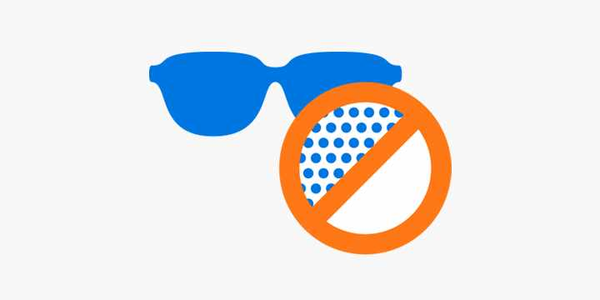SAFELOOX offer lens coatings such as anti-fog and anti-reflective for most of our Safety Glasses. Depending on the model, these lens coatings are included or are an optional extra. Our customers often ask us, “Are anti-fog and anti-reflective coatings worth adding to my splash or radiation safety glasses”? Although it is everyone’s individual decision, we believe it is, as they increase your safety, vision and comfort during all your shifts. Learn more about these lens coatings and what they can do for your eyesight.
What are the Benefits and Drawbacks of Anti-fog and Anti-Reflective Coatings?
 |
 |
Anti-fog Coating (AF)
|
Anti-reflective Coating (AR)
|
| AF lens coating can be added to the inside of your lenses to control the built-up of moisture on the surface of the lenses. Main causes for fogging in a medical environment are body heat and wearing face coverings. A face mask tends to cause our warm breath to go up into the area of our eyes, resulting in fogging lenses. |
An AR lens coatings - also called anti-glare (AG) coating - is applied to your lenses to manage the amount of light that enters your eyes. AR coatings significantly block reflections from the surfaces of your lenses, especially in bright light environments, such as operating theatres. Without these reflections more light can pass through. |
Main Benefits
|
- Decreased eye injuries as fogged lenses are the main reason why healthcare workers remove their safety eyewear.
- Increased safety compliance
- Keeping a permanent clear vision improving worker’s performance
|
- Increasing vision and enhancing clarity as more light can enter your eyes.
- Reducing eye strain and eye fatigue due to minimised lens reflections.
- Increasing your comfort during extended screen use and keeping your eyes from drying out.
|
AF coated lenses may be for you if:
- You work in medical environments required to wear face coverings.
- You work in situations involving high physical activity causing body heat, temperature changes, and humidity.
|
AR coated lenses may be for you if:
- You work in an environment with lots of bright light, like hospitals, and are often bothered by light reflections when wearing safety glasses.
- You spend a long time looking at screens or other digital devices
- You have difficulty seeing while driving at night
|
Drawbacks
|
- Some people find buying safety glasses with one or the other lens coating more expensive than regular safety eyewear as the lens coatings usually are an added option you need to pay for.
- In addition, both lens coatings require special cleaning instructions to ensure the AF and AR coating last as long as possible.
General guidelines for proper use and storage are:
- Always clean them after use with mild soap only.
- Never use any type of cleaning solution that contains alcohol water or other abrasive cleaners to reduce any potential damage.
- Always store in your safety glasses in your hard case when not being used to avoid damages of lenses and the coating from peeling off sooner than expected.
- Keep your coated safety glasses away from extreme heat or cold, which could cause the coatings to peel off more quickly than usually.
|
The Takeaway
|
|
Anti-fog and anti-reflective lens coatings can significantly increase your eye safety, vision, and comfort, especially when fogging is a concern. When you need to buy a pair of medical safety glasses, consider the benefits coated lenses can provide.
Contact us today, if you do have any more questions or concerns that you’d like to discuss with us.
|
 |
Anti-fog Coating (AF)
|
| AF lens coating can be added to the inside of your lenses to control the built-up of moisture on the surface of the lenses. Main causes for fogging in a medical environment are body heat and wearing face coverings. A face mask tends to cause our warm breath to go up into the area of our eyes, resulting in fogging lenses. |
Main Benefits
|
- Decreased eye injuries as fogged lenses are the main reason why healthcare workers remove their safety eyewear.
- Increased safety compliance
- Keeping a permanent clear vision improving worker’s performance
|
AF coated lenses may be for you if:
- You work in medical environments required to wear face coverings.
- You work in situations involving high physical activity causing body heat, temperature changes, and humidity.
|
Drawbacks
|
- Some people find buying safety glasses with one or the other lens coating more expensive than regular safety eyewear as the lens coatings usually are an added option you need to pay for.
- In addition, both lens coatings require special cleaning instructions to ensure the AF and AR coating last as long as possible.
General guidelines for proper use and storage are:
- Always clean them after use with mild soap only.
- Never use any type of cleaning solution that contains alcohol water or other abrasive cleaners to reduce any potential damage.
- Always store in your safety glasses in your hard case when not being used to avoid damages of lenses and the coating from peeling off sooner than expected.
- Keep your coated safety glasses away from extreme heat or cold, which could cause the coatings to peel off more quickly than usually.
|
The Takeaway
|
|
Anti-fog and anti-reflective lens coatings can significantly increase your eye safety, vision, and comfort, especially when fogging is a concern. When you need to buy a pair of medical safety glasses, consider the benefits coated lenses can provide.
Contact us today, if you do have any more questions or concerns that you’d like to discuss with us.
|
|
 |
Anti-reflective Coating (AR)
|
| An AR lens coatings - also called anti-glare (AG) coating - is applied to your lenses to manage the amount of light that enters your eyes. AR coatings significantly block reflections from the surfaces of your lenses, especially in bright light environments, such as operating theatres. Without these reflections more light can pass through. |
Main Benefits
|
- Increasing vision and enhancing clarity as more light can enter your eyes.
- Reducing eye strain and eye fatigue due to minimised lens reflections.
- Increasing your comfort during extended screen use and keeping your eyes from drying out.
|
AR coated lenses may be for you if:
- You work in an environment with lots of bright light, like hospitals, and are often bothered by light reflections when wearing safety glasses.
- You spend a long time looking at screens or other digital devices
- You have difficulty seeing while driving at night
|
Drawbacks
|
- Some people find buying safety glasses with one or the other lens coating more expensive than regular safety eyewear as the lens coatings usually are an added option you need to pay for.
- In addition, both lens coatings require special cleaning instructions to ensure the AF and AR coating last as long as possible.
General guidelines for proper use and storage are:
- Always clean them after use with mild soap only.
- Never use any type of cleaning solution that contains alcohol water or other abrasive cleaners to reduce any potential damage.
- Always store in your safety glasses in your hard case when not being used to avoid damages of lenses and the coating from peeling off sooner than expected.
- Keep your coated safety glasses away from extreme heat or cold, which could cause the coatings to peel off more quickly than usually.
|
The Takeaway
|
|
Anti-fog and anti-reflective lens coatings can significantly increase your eye safety, vision, and comfort, especially when fogging is a concern. When you need to buy a pair of medical safety glasses, consider the benefits coated lenses can provide.
Contact us today, if you do have any more questions or concerns that you’d like to discuss with us.
|